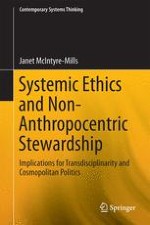2014 | OriginalPaper | Buchkapitel
5. Remembering, Reconnecting and Redirecting the Gaze
verfasst von : Janet McIntyre-Mills
Erschienen in: Systemic Ethics and Non-Anthropocentric Stewardship
Aktivieren Sie unsere intelligente Suche, um passende Fachinhalte oder Patente zu finden.
Wählen Sie Textabschnitte aus um mit Künstlicher Intelligenz passenden Patente zu finden. powered by
Markieren Sie Textabschnitte, um KI-gestützt weitere passende Inhalte zu finden. powered by
